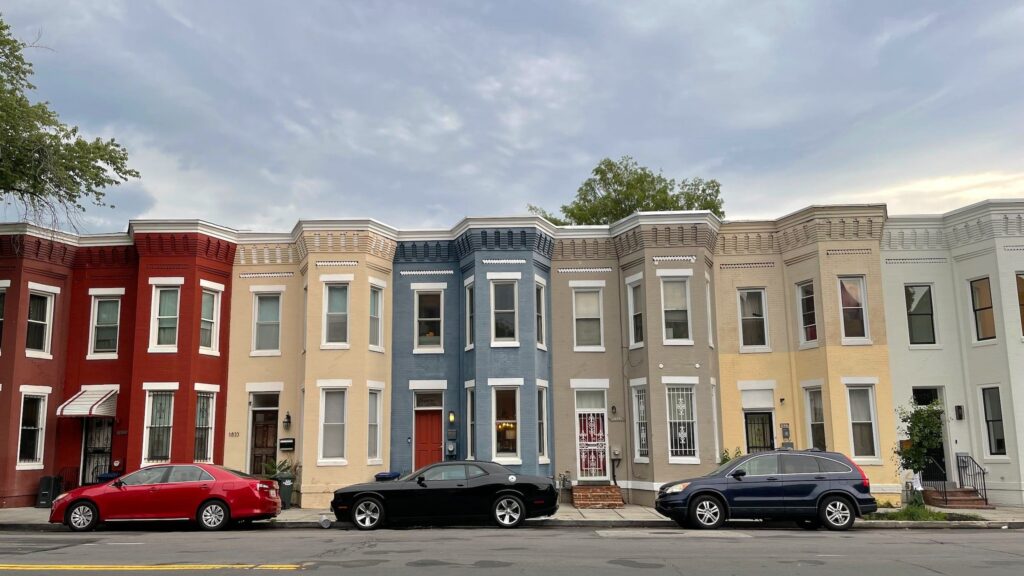
Navigating the real estate market in the DMV area—encompassing Washington D.C., Maryland, and Virginia—can be a complex decision with multiple factors to consider. The question of whether to rent or buy is particularly pertinent today, given the fluctuations in the market influenced by economic trends, interest rates, and regional growth.
This comprehensive guide compiled by Sid Hameed‘s Brickfront and Local Washington DC Construction will explore the pros and cons of renting versus buying in the DMV area, backed by the latest statistics and analyses, to help you make an informed decision.
Understanding the DMV Real Estate Market
The DMV real estate market is characterized by its diversity, with varying trends across different counties and cities. The area is influenced by its proximity to the federal government, robust job market, and a rich array of cultural and educational institutions. As of the latest reports, the DMV area is experiencing:
- High demand for housing: Driven by a strong job market and an influx of new residents.
- Rising home prices: Median home prices have seen a consistent upward trend, with certain areas experiencing double-digit growth year-over-year.
- Low inventory levels: The supply of available homes has struggled to keep up with demand, leading to a competitive market for buyers.
- Volatile rent prices: Rent prices have fluctuated, with significant increases in some areas, driven by demand and the overall cost of living.

Renting in the DMV Area

Pros of Renting
Flexibility
Renting offers flexibility that is appealing to many, especially those who may need to move frequently for work or personal reasons. Leases typically last for 12 months, providing an easier way to relocate compared to selling a home.
Lower Upfront Costs
Renters generally face lower upfront costs than home buyers. The initial outlay usually includes a security deposit and the first month’s rent, as opposed to a sizable down payment, closing costs, and other home-buying fees.
No Maintenance Hassles
Renters are not responsible for maintenance and repairs. This responsibility falls to the landlord, saving renters time and potentially large expenses.
Cons of Renting
Lack of Equity
Rent payments do not contribute to home equity. The money paid in rent is a cost without financial return in terms of property investment.
Rent Increases
Renters face potential annual rent increases, which can outpace inflation or wage growth, especially in high-demand areas.
Less Control
Living in a rental property means adhering to the terms set by landlords, which can include restrictions on modifications and pet ownership.
Renting Statistics
- Average Rent in D.C.: As per the latest figures, the average rent for a one-bedroom apartment in Washington, D.C., is approximately $2,200, varying significantly by neighborhood.
Buying in the DMV Area

Pros of Buying
Building Equity
Homeownership allows individuals to build equity over time, which can be a significant part of one’s financial future.
Tax Benefits
Homeowners can take advantage of tax deductions such as mortgage interest and property taxes, which can provide substantial savings.
Stable Payments
With a fixed-rate mortgage, monthly payments remain consistent, unlike rents which can increase annually.
Cons of Buying
High Upfront Costs
Buying a home requires a down payment, closing costs, and other initial expenses that can be quite substantial.
Maintenance Responsibilities
Homeowners are responsible for all maintenance and repairs, which can be unpredictable and costly.
Market Risk
The value of a home can fluctuate depending on the housing market, potentially affecting the resale value negatively.
Buying Statistics
- Median Home Price in the DMV: The median home price in the DMV area has reached approximately $500,000, with significant variations between different locales.
Financial Analysis
Cost Comparisons
To determine whether renting or buying is more financially advantageous, one can use the price-to-rent ratio. The ratio is calculated by dividing the median home price by the annual rent for a comparable property. A higher ratio suggests that renting might be better, while a lower ratio favors buying.
Long-Term Financial Impact
Owning a home is traditionally seen as a long-term investment. Despite the high upfront costs, the potential for equity growth and the stability of fixed mortgage payments can outweigh the costs of renting over time, particularly in a market with appreciating property values like the DMV.
Future Market Predictions
Real estate market trends indicate that the DMV area will continue to experience growth, driven by its strong economic fundamentals and the influx of a skilled workforce attracted by government and tech-related employment opportunities. While home prices may continue to rise, the long-term investment potential typically outweighs the cost concerns, particularly for those planning to stay in the area for an extended period.
How to Decide: Rent vs. Buy

Consider Your Time Horizon
The length of time you plan to stay in a location can heavily influence whether renting or buying is the better option. Generally, if you plan to stay in one place for less than five years, renting might be more cost-effective due to the high transaction costs associated with buying and selling a home.
Analyze Your Financial Health
Your current financial health is crucial in this decision. Can you afford the down payment without compromising your financial stability? Do you have an emergency fund after purchasing a home? These questions can help determine whether to buy now or possibly wait.
Future Goals and Lifestyle Needs
Consider how your housing choice aligns with your long-term personal and career goals. Buying a home can offer stability and a sense of community while renting might be better suited for those who value flexibility and minimal responsibility.
Use Financial Calculators
Many online tools and calculators are available to help compare the financial implications of renting versus buying. These tools consider factors like home appreciation, rent inflation, investment returns, and more, providing a more nuanced view of the financial impact over time.
Resources for Making the Decision
- Housing Counselors: Consulting with a housing counselor certified by the U.S. Department of Housing and Urban Development (HUD) can provide personalized advice based on your financial situation and goals.
- Real Estate Agents: A knowledgeable real estate agent familiar with the DMV market can offer valuable insights into the nuances of local neighborhoods and help navigate the buying process.
- Financial Planners: A financial planner can help assess how buying a home fits into your overall financial plan, including savings, investments, and retirement planning.
Conclusion
The decision to rent or buy in the DMV market depends heavily on personal circumstances, financial stability, and long-term goals. Renting offers flexibility and lower initial costs, making it suitable for those uncertain about their long-term plans or unwilling to commit to the responsibilities of homeownership.
On the other hand, buying is a significant investment that can offer financial benefits through equity, tax deductions, and potential appreciation in property value.
For those considering this decision, Sid Hameed‘s Brickfront and Local Washington DC Construction is reminding you to conduct thorough research, possibly consult with real estate and financial professionals, and carefully consider both personal lifestyle needs and financial goals.

